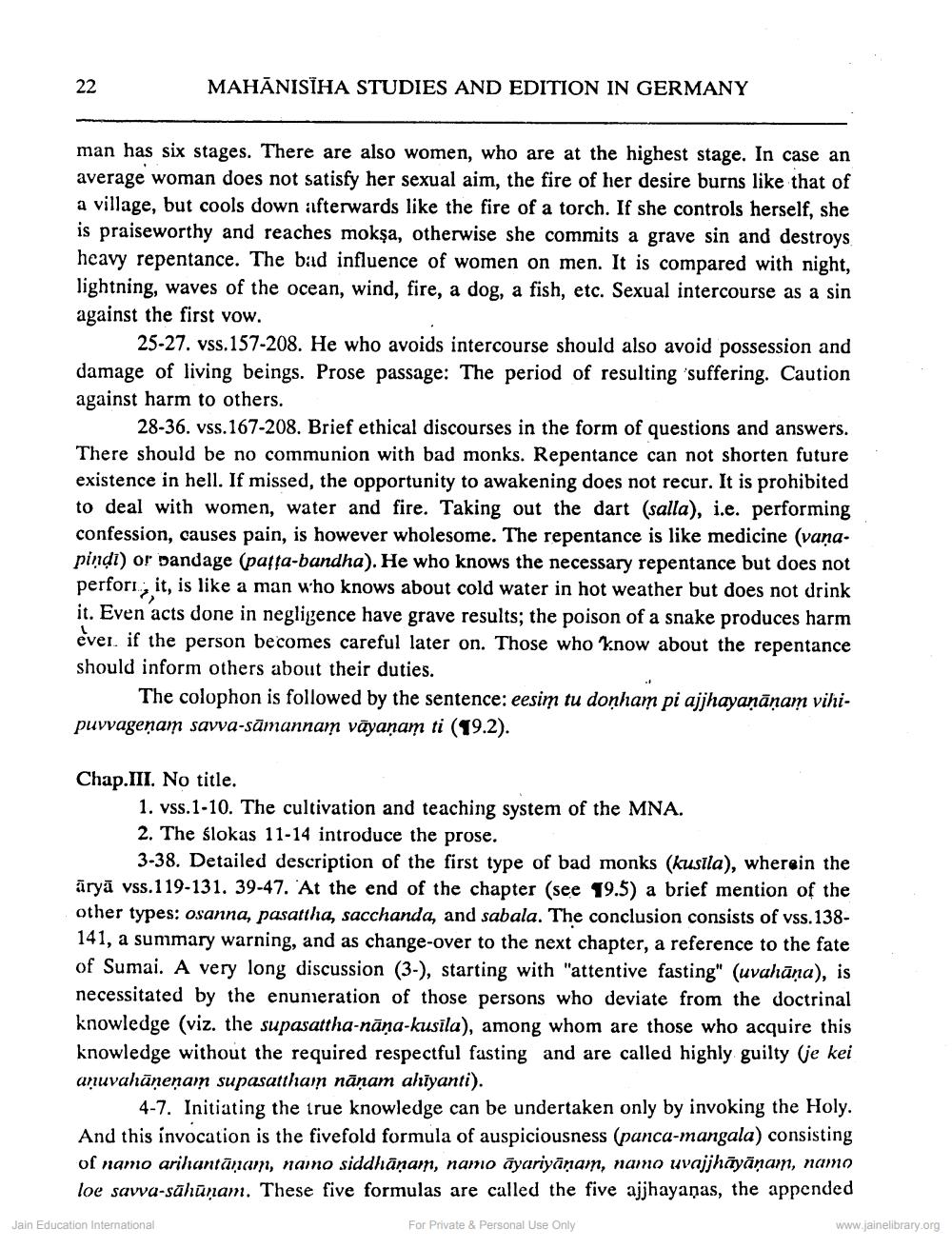________________
22
MAHĀNISĪHA STUDIES AND EDITION IN GERMANY
man has six stages. There are also women, who are at the highest stage. In case an average woman does not satisfy her sexual aim, the fire of her desire burns like that of a village, but cools down afterwards like the fire of a torch. If she controls herself, she is praiseworthy and reaches mokşa, otherwise she commits a grave sin and destroys heavy repentance. The bad influence of women on men. It is compared with night, lightning, waves of the ocean, wind, fire, a dog, a fish, etc. Sexual intercourse as a sin against the first vow.
25-27. vss. 157-208. He who avoids intercourse should also avoid possession and damage of living beings. Prose passage: The period of resulting 'suffering. Caution against harm to others.
28-36. vss.167-208. Brief ethical discourses in the form of questions and answers. There should be no communion with bad monks. Repentance can not shorten future existence in hell. If missed, the opportunity to awakening does not recur. It is prohibited to deal with women, water and fire. Taking out the dart (salla), i.e. performing confession, causes pain, is however wholesome. The repentance is like medicine (vaņapindi) or bandage (patta-bandha). He who knows the necessary repentance but does not perfori, it, is like a man who knows about cold water in hot weather but does not drink it. Even acts done in negligence have grave results; the poison of a snake produces harm ever, if the person becomes careful later on. Those who know about the repentance should inform others about their duties.
The colophon is followed by the sentence: eesim tu donham pi ajjhayaņāņam vihipuvvageņam savva-sāmannam vāyaṇam ti (19.2).
Chap.III. No title.
1. vss.1-10. The cultivation and teaching system of the MNA. 2. The slokas 11-14 introduce the prose.
3-38. Detailed description of the first type of bad monks (kusila), wherein the āryā vss.119-131. 39-47. At the end of the chapter (see 19.5) a brief mention of the other types: osanna, pasattha, sacchanda, and sabala. The conclusion consists of vss.138141, a summary warning, and as change-over to the next chapter, a reference to the fate of Sumai. A very long discussion (3-), starting with "attentive fasting" (uvahāna), is necessitated by the enumeration of those persons who deviate from the doctrinal knowledge (viz. the supasattha-nāna-kusila), among whom are those who acquire this knowledge without the required respectful fasting and are called highly guilty (je kei anuvahāņeņain supasattham nāņam ahiyanti).
4-7. Initiating the true knowledge can be undertaken only by invoking the Holy. And this invocation is the fivefold formula of auspiciousness (panca-mangala) consisting of namo arihantānam, namo siddhānam, namo āyariyāṇam, namo uvajjhāyānam, namo loe savva-sähūņam. These five formulas are called the five ajjhayaņas, the appended
Jain Education International
For Private & Personal Use Only
www.jainelibrary.org




